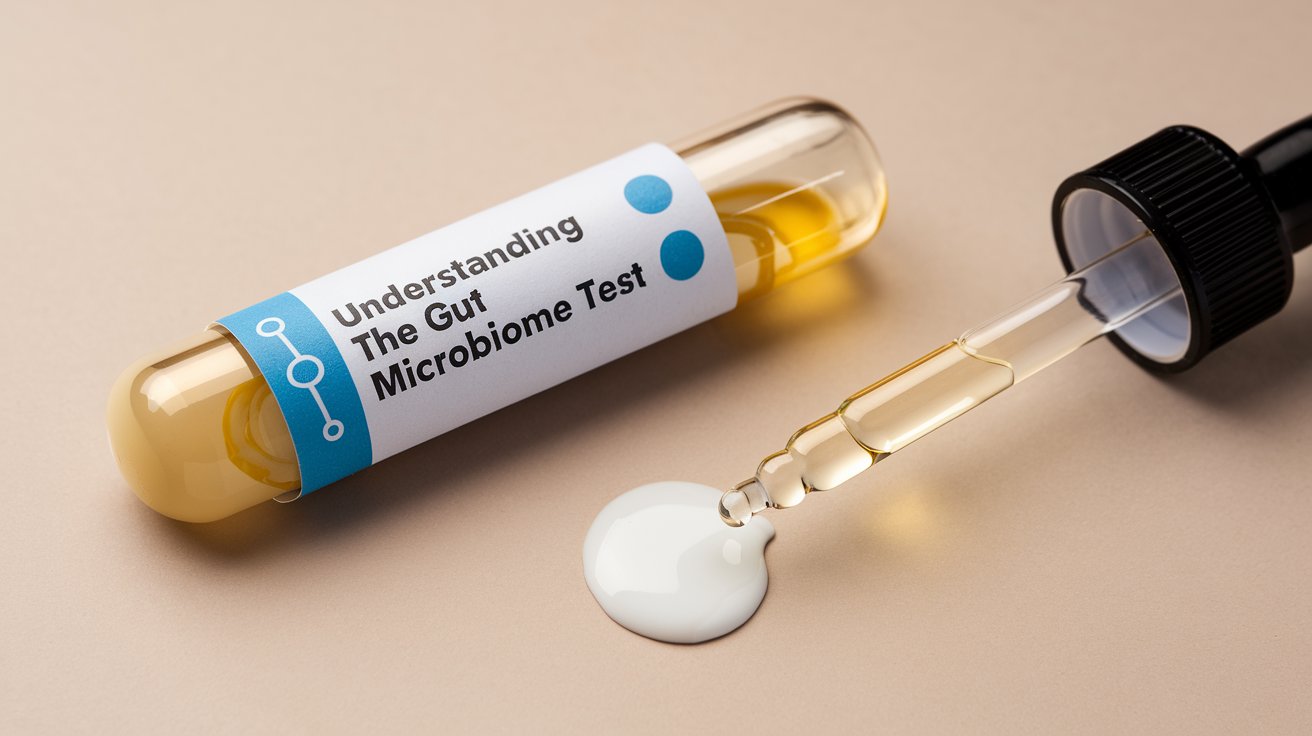आंत माइक्रोबायोम आपके समग्र स्वास्थ्य को बनाए रखने में महत्वपूर्ण भूमिका निभाता है। आपकी आंत में रहने वाले खरबों सूक्ष्मजीव - बैक्टीरिया, कवक, वायरस - पाचन से लेकर प्रतिरक्षा और यहां तक कि मानसिक स्वास्थ्य तक सब कुछ प्रभावित करते हैं। स्वास्थ्य के क्षेत्र में आंत का स्वास्थ्य एक चर्चित विषय बन गया है, इसलिए आंत माइक्रोबायोम परीक्षणों ने आपके पाचन स्वास्थ्य की स्थिति को बेहतर ढंग से समझने में आपकी मदद करने के लिए एक उपकरण के रूप में लोकप्रियता हासिल की है।
इस ब्लॉग में, हम जानेंगे कि आंत माइक्रोबायोम परीक्षण क्या है, यह क्यों महत्वपूर्ण है, यह कैसे काम करता है, और आप इसके परिणामों का उपयोग अपने आंत के स्वास्थ्य और समग्र कल्याण को बेहतर बनाने के लिए कैसे कर सकते हैं।
आंत माइक्रोबायोम क्या है?
आंत माइक्रोबायोम परीक्षण की बारीकियों में जाने से पहले, यह समझना ज़रूरी है कि आंत माइक्रोबायोम वास्तव में क्या है। आंत माइक्रोबायोम आपके जठरांत्र संबंधी मार्ग में रहने वाले सूक्ष्मजीवों के विशाल समुदाय को संदर्भित करता है। ये सूक्ष्मजीव, जिनमें बैक्टीरिया, वायरस और कवक शामिल हैं, आवश्यक शारीरिक कार्यों में योगदान करते हैं, जैसे:
- भोजन पचाना: कुछ आंत के बैक्टीरिया जटिल कार्बोहाइड्रेट और फाइबर को तोड़ने में मदद करते हैं जिन्हें आपका शरीर स्वयं नहीं पचा सकता।
- विटामिन का उत्पादन: कुछ आंत बैक्टीरिया आवश्यक विटामिन जैसे विटामिन K और कुछ विटामिन B का उत्पादन करते हैं।
- प्रतिरक्षा कार्य को समर्थन देना: एक स्वस्थ आंत माइक्रोबायोम आपकी प्रतिरक्षा प्रणाली को विनियमित करने में मदद करता है, तथा आपको हानिकारक रोगाणुओं से बचाता है।
- मानसिक स्वास्थ्य को प्रभावित करना: आंत और मस्तिष्क आंत-मस्तिष्क अक्ष के माध्यम से जुड़े होते हैं, आंत के बैक्टीरिया मूड विनियमन और मानसिक स्वास्थ्य में भूमिका निभाते हैं।
आपके आंत माइक्रोबायोम के संतुलन में व्यवधान, जिसे डिस्बिओसिस के रूप में जाना जाता है, को विभिन्न स्वास्थ्य समस्याओं से जोड़ा गया है, जिसमें पाचन विकार, मोटापा, मधुमेह, स्वप्रतिरक्षी रोग और यहां तक कि चिंता और अवसाद जैसी मानसिक स्वास्थ्य समस्याएं भी शामिल हैं।
आंत माइक्रोबायोम परीक्षण क्या है?
आंत माइक्रोबायोम परीक्षण एक ऐसा उपकरण है जो मल के नमूने की जांच करके आपके आंत बैक्टीरिया की संरचना का विश्लेषण करता है। यह परीक्षण आपके आंत में सूक्ष्मजीवों के प्रकार और मात्रा का विस्तृत विवरण प्रदान करता है। आंत माइक्रोबायोम परीक्षण से प्राप्त जानकारी के साथ, आप असंतुलन, संभावित आहार संबंधी कमियों और किसी भी हानिकारक बैक्टीरिया की पहचान कर सकते हैं जो स्वास्थ्य समस्याओं का कारण बन सकते हैं।
आपको आंत माइक्रोबायोम परीक्षण क्यों करवाना चाहिए?
आंत माइक्रोबायोम परीक्षण कराने पर विचार करने के लिए यहां कई सम्मोहक कारण दिए गए हैं:
1. पाचन स्वास्थ्य में सुधार
यदि आपको अक्सर पेट फूलना, गैस, कब्ज, दस्त या अपच जैसी पाचन संबंधी समस्याएं होती हैं, तो आंत माइक्रोबायोम परीक्षण अंतर्निहित कारणों का पता लगा सकता है। परीक्षण यह पता लगाने में मदद करता है कि क्या आंत के बैक्टीरिया में असंतुलन है जो आपके लक्षणों में योगदान दे सकता है। इस जानकारी के साथ, आप असुविधा को कम करने और पाचन में सुधार करने के लिए लक्षित आहार परिवर्तन कर सकते हैं।
2. प्रतिरक्षा कार्य को बढ़ाएँ
चूँकि आपकी प्रतिरक्षा प्रणाली का एक महत्वपूर्ण हिस्सा आपकी आंत में रहता है, इसलिए मजबूत प्रतिरक्षा बनाए रखने के लिए एक स्वस्थ माइक्रोबायोम आवश्यक है। आंत के बैक्टीरिया में असंतुलन आपकी प्रतिरक्षा सुरक्षा को कमजोर कर सकता है, जिससे आप संक्रमण और पुरानी बीमारियों के प्रति अधिक संवेदनशील हो सकते हैं। आंत माइक्रोबायोम परीक्षण आपको उन असंतुलनों की पहचान करके आपकी प्रतिरक्षा स्वास्थ्य को बढ़ावा देने में मदद कर सकता है जिन्हें सुधार की आवश्यकता है।
3. मानसिक स्वास्थ्य का समर्थन करें
आंत का स्वास्थ्य आंत-मस्तिष्क अक्ष के माध्यम से मानसिक स्वास्थ्य से जटिल रूप से जुड़ा हुआ है। आंत के बैक्टीरिया में असंतुलन मूड विनियमन और मानसिक स्वास्थ्य को प्रभावित कर सकता है। चिंता, अवसाद या मस्तिष्क कोहरे जैसी स्थितियों से पीड़ित व्यक्तियों को आंत माइक्रोबायोम परीक्षण से लाभ हो सकता है ताकि यह पता लगाया जा सके कि डिस्बिओसिस इन समस्याओं में योगदान दे रहा है या नहीं।
4. व्यक्तिगत पोषण
सभी खाद्य पदार्थ लोगों को एक जैसा प्रभावित नहीं करते। आपका आंत माइक्रोबायोम इस बात को प्रभावित कर सकता है कि आप भोजन को कैसे चयापचय करते हैं और पोषक तत्वों को कैसे अवशोषित करते हैं। माइक्रोबायोम परीक्षण आपके अद्वितीय आंत संरचना के लिए सबसे अच्छा काम करने वाले खाद्य पदार्थों के प्रकारों की पहचान करके पोषण के लिए एक व्यक्तिगत दृष्टिकोण की अनुमति देता है। यह पाचन, वजन प्रबंधन और समग्र स्वास्थ्य को अनुकूलित करने में मदद कर सकता है।
5. खाद्य पदार्थों के प्रति संवेदनशीलता की पहचान करें
खाद्य पदार्थों के प्रति संवेदनशीलता और असहिष्णुता पाचन संबंधी असुविधा, त्वचा संबंधी समस्याएं, थकान और अन्य स्वास्थ्य समस्याओं का कारण बन सकती है। आंत माइक्रोबायोम परीक्षण से पता चल सकता है कि आंत के बैक्टीरिया में असंतुलन इन संवेदनशीलताओं में योगदान दे रहा है या नहीं, जिससे आप अपने आहार को तदनुसार समायोजित कर सकते हैं।
आंत माइक्रोबायोम परीक्षण कैसे काम करता है?
आंत माइक्रोबायोम परीक्षण की प्रक्रिया सरल और गैर-आक्रामक है। यह आमतौर पर इस तरह काम करता है:
1. टेस्ट किट का ऑर्डर दें
आप ऑनलाइन या अपने स्वास्थ्य सेवा प्रदाता के माध्यम से विभिन्न प्रदाताओं से आंत माइक्रोबायोम परीक्षण किट मंगवा सकते हैं। किट में आमतौर पर मल का एक छोटा सा नमूना एकत्र करने के निर्देश और सामग्री शामिल होती है।
2. नमूना एकत्र करें
अपने मल का नमूना लेने के लिए टेस्ट किट में दिए गए निर्देशों का पालन करें। आमतौर पर, उचित संग्रह सुनिश्चित करने के लिए आपको एक छोटा कंटेनर और एक स्वाब दिया जाएगा।
3. नमूना प्रयोगशाला में भेजें
नमूना एकत्र करने के बाद, आप इसे विश्लेषण के लिए प्रयोगशाला में भेजेंगे। प्रयोगशाला आपके पेट में बैक्टीरिया के प्रकार और उनकी सापेक्ष प्रचुरता की पहचान करने के लिए 16S rRNA अनुक्रमण जैसी उन्नत अनुक्रमण तकनीकों का उपयोग करेगी।
4. अपने परिणाम प्राप्त करें
एक बार जब प्रयोगशाला आपके नमूने को संसाधित कर लेती है, तो आपको अपने आंत माइक्रोबायोम संरचना की एक विस्तृत रिपोर्ट प्राप्त होगी। इस रिपोर्ट में आपके आंत में बैक्टीरिया के प्रकार, उनकी विविधता और मौजूद किसी भी असंतुलन या हानिकारक बैक्टीरिया के बारे में जानकारी शामिल होगी।
5. व्यक्तिगत अनुशंसाएँ प्राप्त करें
आपके परिणामों के आधार पर, आपको अक्सर अपने आंत माइक्रोबायोम को संतुलित करने में मदद करने के लिए व्यक्तिगत आहार और जीवनशैली संबंधी सिफारिशें प्राप्त होंगी। इन सिफारिशों में बेहतर आंत स्वास्थ्य को बढ़ावा देने के लिए विशिष्ट प्रोबायोटिक सप्लीमेंट, आहार समायोजन या जीवनशैली में बदलाव शामिल हो सकते हैं।
अपने स्वास्थ्य को बेहतर बनाने के लिए आंत माइक्रोबायोम परीक्षण के परिणामों का उपयोग कैसे करें
अपने आंत माइक्रोबायोम परीक्षण के परिणाम प्राप्त करना तो बस शुरुआत है। यहाँ बताया गया है कि आप अपने स्वास्थ्य को बेहतर बनाने के लिए इन जानकारियों का उपयोग कैसे कर सकते हैं:
1. प्रोबायोटिक युक्त खाद्य पदार्थों को शामिल करें
अगर आपके टेस्ट से पता चलता है कि आपके शरीर में फायदेमंद बैक्टीरिया का स्तर कम है, तो आप अपने आहार में प्रोबायोटिक युक्त खाद्य पदार्थों को शामिल कर सकते हैं। प्रोबायोटिक्स के कुछ बेहतरीन स्रोतों में शामिल हैं:
- दही
- केफिर
- खट्टी गोभी
- किम्ची
- कोम्बुचा
- मिसो
इन खाद्य पदार्थों में जीवित बैक्टीरिया होते हैं जो आपके आंत माइक्रोबायोम को स्वस्थ सूक्ष्मजीवों से भरने में मदद कर सकते हैं।
2. अपने फाइबर सेवन को बढ़ाएँ
फाइबर से भरपूर आहार फायदेमंद आंत बैक्टीरिया के विकास को बढ़ावा देता है। प्रीबायोटिक फाइबर से भरपूर खाद्य पदार्थ - जो अच्छे बैक्टीरिया को पोषण देते हैं - में शामिल हैं:
- लहसुन
- प्याज
- केले
- जई
- शतावरी
- लीक
अधिक फाइबर खाने से सूक्ष्मजीव विविधता बढ़ सकती है और आंत की कार्यप्रणाली में सुधार हो सकता है।
3. हानिकारक बैक्टीरिया को खत्म करें
यदि आपके परीक्षण में हानिकारक बैक्टीरिया की अत्यधिक वृद्धि का पता चलता है, तो आपको इन सूक्ष्मजीवों को भूखा रखने के लिए अपने आहार को समायोजित करने की आवश्यकता हो सकती है। खराब बैक्टीरिया को खिलाने वाले चीनी और परिष्कृत कार्बोहाइड्रेट को कम करने से आपके पेट में संतुलन बहाल करने में मदद मिल सकती है।
4. प्रोबायोटिक सप्लीमेंट्स लें
कभी-कभी, सिर्फ़ आहार में बदलाव आपके आंत के माइक्रोबायोम में संतुलन बहाल करने के लिए पर्याप्त नहीं हो सकता है। ऐसे मामलों में, एक स्वास्थ्य सेवा प्रदाता विशिष्ट प्रोबायोटिक सप्लीमेंट की सलाह दे सकता है जो आपके सिस्टम में लाभकारी बैक्टीरिया को शामिल कर सकता है।
5. तनाव के स्तर को प्रबंधित करें
क्रोनिक तनाव आंतों के स्वास्थ्य पर नकारात्मक प्रभाव डाल सकता है, जिससे डिस्बिओसिस हो सकता है। योग, ध्यान या नियमित व्यायाम जैसी तनाव कम करने वाली गतिविधियों को शामिल करने से आंतों को स्वस्थ रखने में मदद मिल सकती है।
निष्कर्ष
आंत माइक्रोबायोम परीक्षण आपके पाचन स्वास्थ्य और आपके समग्र स्वास्थ्य से इसके संबंध को समझने के लिए एक शक्तिशाली उपकरण है। आपके आंत में सूक्ष्मजीवों के संतुलन को प्रकट करके, परीक्षण अंतर्दृष्टि प्रदान करता है जो आहार, जीवनशैली और पूरक आहार के लिए व्यक्तिगत अनुशंसाओं को जन्म दे सकता है। चाहे आप पाचन संबंधी परेशानी से जूझ रहे हों, अपनी प्रतिरक्षा प्रणाली को बढ़ावा देना चाहते हों, या बस अपने स्वास्थ्य को बेहतर बनाना चाहते हों, आंत माइक्रोबायोम परीक्षण आपको आवश्यक मार्गदर्शन प्रदान कर सकता है।
अपने पेट के स्वास्थ्य पर नियंत्रण रखने से पाचन में सुधार, मानसिक स्पष्टता, बेहतर प्रतिरक्षा कार्य और समग्र जीवन शक्ति प्राप्त हो सकती है। अपने पेट के पीछे के विज्ञान को अपनाएँ और स्वस्थ, खुशहाल जीवन की ओर पहला कदम बढ़ाएँ।















